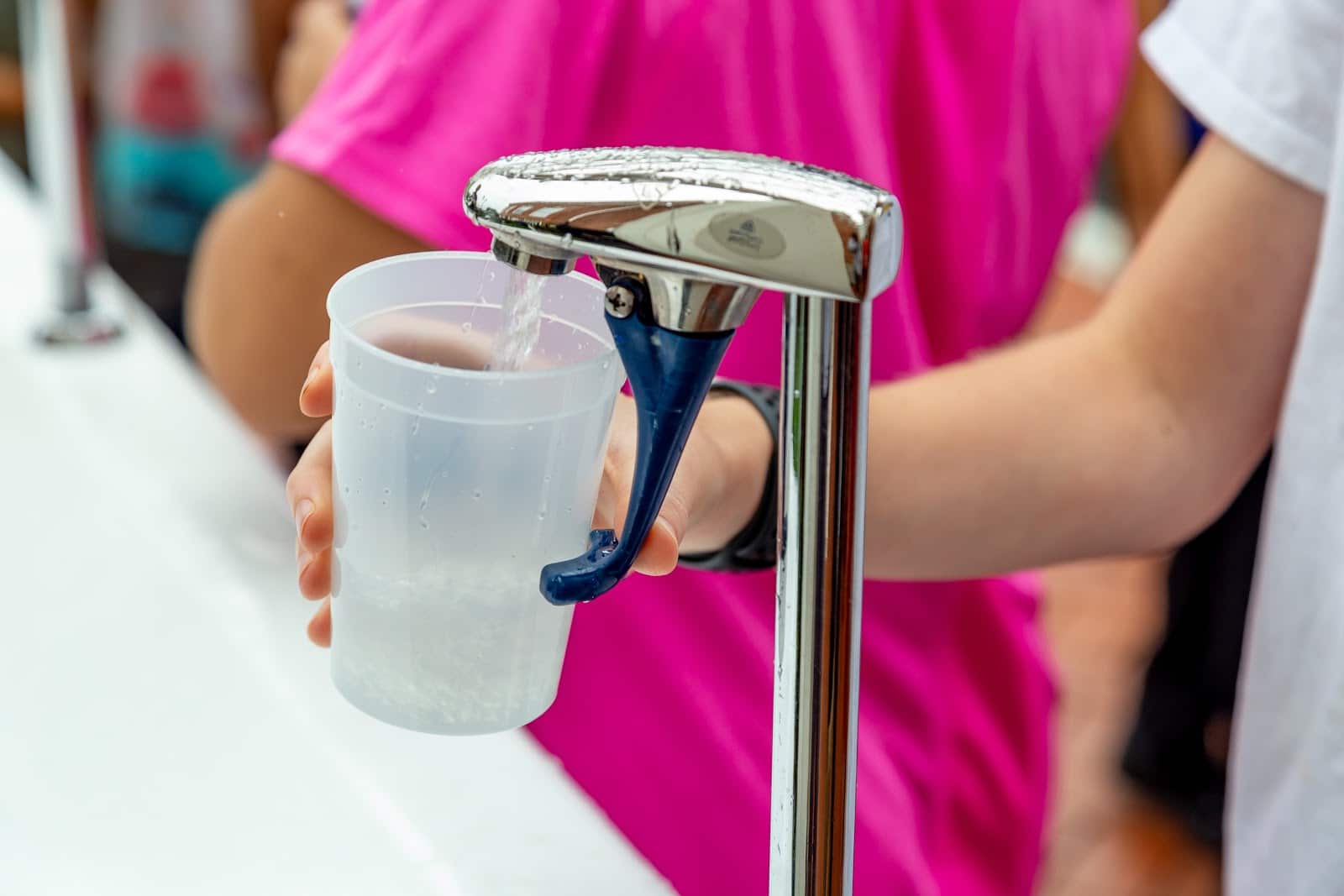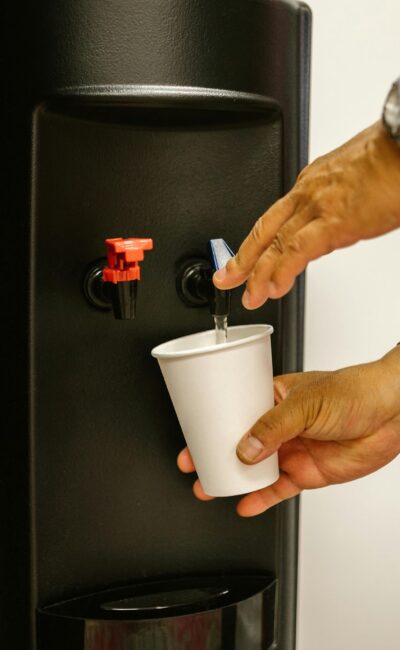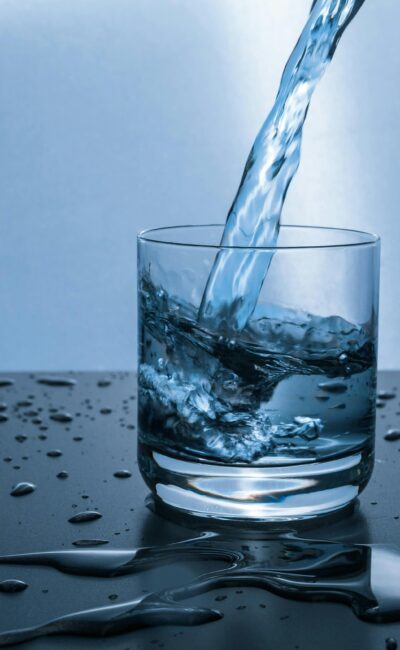Encouraging gym members to drink water post-workout is vital in keeping customers happy, healthy and recover faster. Here’s how to educate your clientele.
Whether you’re drinking water before, during, or after the workout, hydration and exercise go hand-in-hand. From a few sips of water before a mellow yoga class to a big refillable water bottle following a strenuous cycling class, hydrating is a part of working out.
If you’re a gym owner or manager, encouraging members to drink water post-workout is vital in keeping customers happy and healthy and helping them to recover faster.
From the importance of hydration on a physical level to installing a hydration center, here’s how to educate your clientele.
The Importance of Hydration
When we’re dehydrated, even at low levels, we can feel sluggish and lethargic. It can cause headaches, constipation, and dizziness. Athletes are at a greater risk of dehydration, particularly those who participate in endurance sports or classes, like cycling or marathon racing.
Throughout our cells and blood vessels, the human body is roughly 75% water, and we need that water to survive. Hydration couldn’t be more crucial to our overall health, that’s why it’s important to implement proper hydration habits before and after your workouts.
The benefits of staying hydrated and drinking enough water are vast, especially when it comes to what you do post-workout. If you are dehydrated after a tough workout, your recovery will be delayed — as the protein synthesis that rebuilds your muscles will be slowed. That’s why people who are serious about hitting the gym, are also serious about their water post-workout.
According to Drip Drop dehydration relief, there are four big components as to why hydrating properly is crucial to your muscle recovery.
Muscular Repair
When you exercise, your muscles get stronger. It does this by breaking them down and then using muscle protein synthesis to rebuild them. With this synthesis, however, your muscles must be well-hydrated. If they aren’t, the synthesis will be slowed and your recovery will be delayed.
Digestion
Food is as important as water post-workout. When you’re done working out and ready to refuel your body, you’ll need to have enough water in your system in order to aid in the digestion process and ensure you have enough saliva to break down your food.
Fatigue
Fatigue is one of the main signs of dehydration. Because your blood volume decreases when you’re dehydrated, your heart has to work harder to pump blood flow to other parts of the body. Fatigue will leave you feeling sluggish after your workout — and not quite ready to take on the next one the following day.
Heart Rate Recovery
As DripDrop mentions, a 2012 study found that hydration played a large role in recovery. They mention an experiment where the subjects did 90 minutes of running under a treadmill. Some subjects stay hydrated during and after the workout and some did not hydrate at all. Results showed that those who hydrated had a faster heart rate recovery post-workout (which means that their bodies were able to recover faster).
And What About Heat Illness?
You might have heard the term heat illness, which happens when your body is dehydrated and can’t cool itself. This is good to be aware of, as it can happen when you exercise in hot or humid weather. The 3 stages of heat illness are heat cramps, heat exhaustion, and heatstroke.
- Symptoms of heat cramps: painful muscle spasms in the legs, stomach, arms, or back
- Symptoms of heat exhaustion: faint or weak feelings, nausea, headache, fast heartbeat, and low blood pressure
- Symptoms of heatstroke (which is the most serious of the 3 stages): high body temperature (higher than 104°F), fast heartbeat, flushed skin, fast breathing, and possibly delirium, loss of consciousness, or seizures
If you experience any of these symptoms either at the gym or when you’re working out alone, it’s crucial that you seek emergency medical attention right away.
Installing a Hydration Center
One of the best ways to retain gym members and ensure they get enough water post-workout is to install a hydration center. Most gyms have some form of a water fountain, but a hydration center takes water to the next level and encourages members to drink more — because it’s easy and it tastes really good.
FloWater uses the newest filter technology in water Refill Stations to create drinking water that tastes and hydrates better than anything in a single-use bottle, delivered into any refillable container. Our Water Refill Station technology is unmatched by any other electric water delivery system. Through attention to detail and high-end features, we pride ourselves on exceeding industry standards and keeping your gym members hydrated.
Make your hydration center even cooler by putting out water infusion ingredients — like mint sprigs, fresh lemon, and cucumber for a bigger boost of hydration. Gone are the days when gym members will say they don’t “like the taste of water”. Keep reminding them that it’s a necessary part of working out, more crucial than a new pair of shoes or the perfect headphones. Water post workout is just as much a part of the workout as the workout itself.
Many say that for moderate level workout activities, plain water is good enough, though if the activity lasts for an hour or more, heavily diluted fruit juice or sports drink will provide carbohydrates and minerals that will help replace the electrolytes lost through sweating.
The Importance of Reusable Water Bottles
Not only do reusable water bottles eliminate plastic waste and help the environment, but they encourage athletes to refill, refill, and refill again. When gym members know exactly how many times they need to refill their bottles to achieve their daily intake, they’ll do it. If you want to promote your gym, consider handing out a free water bottle when a new client signs up. You can also go the route of putting a gym logo on your water bottles, which will help spread the word and get your name out there. Promotions to get new customers make hydration easier and more convenient for them and is a good step towards ensuring proper water intake all around.
Hydrating Before and After Your Workout
In an article on Family Doctor, they offer the following advice from the American Academy of Family Physicians:
- Drink 17 to 20 ounces of water 2 to 3 hours before you start exercising
- Drink 8 ounces of water 20 to 30 minutes before you start exercising or during your warm-up Drink 7 to 10 ounces of water every 10 to 20 minutes during exercise
- Drink 8 ounces of water no more than 30 minutes after you exercise
They also note that everyone is different, which means there are no exact rules for how much water to drink. Water consumption varies depending on sweat rate, heat and humidity of the environment, and how much you are exercising.
Foods for Hydration
Water-rich foods are good to add to your shopping list and to your post-workout diet. It’s said that 20 percent of your water intake comes from food — fruits and veggies, like watermelon and tomatoes, contain 90% or more water content by weight. Think of these foods as a meal and a drink all in one, as they provide minerals, natural sugars, vitamins, and amino acids that are lost during exercise. For something with a bit more substance post-workout, talk to members about adding some plain yogurt or cottage cheese into their wellness resolutions or routine.
- Cucumber
- Celery
- Plain Yogurt
- Zucchini
- Tomatoes
- Cottage Cheese
- Bell Peppers
- Strawberries
- Watermelon
- Broth
- Cantaloupe
- Oranges
- Radish
- Peach
- Pineapple
- Apple
- Eggplant
How Gym Managers and Owners Can Help with Hydration
When you own or manage a gym, it’s important that you build a rapport with clients and talk about ways to adequately hydrate. Educating your gym members on the importance of proper post-workout nutrition and hydration post-workout will help prevent any dehydration and keep your clients excited and eager to workout. In addition to installing a FloWater system, make sure to educate through posters, flyers, and brochures. Hold a hydration workshop to educate your members or keep a water drinking chart next to the hydration station, so clients can keep track of their water intake.
If you’re interested in getting your gym members hydrated with the best tasting water post-workout, get FloWater today. Try a free 14-day trial and if you decide to go another route, and don’t want to continue, we’ll pick it up for free (no fine print).
From all of us at FloWater, thanks for reading! We hope these tips and tricks have inspired you to educate your gym members and keep up with all things water. Staying hydrated is one of the most crucial parts of working out, and it’s necessary that gym members keep up with water post-workout and pre-workout.
Have a happy, healthy, and hydration filled day ahead.




